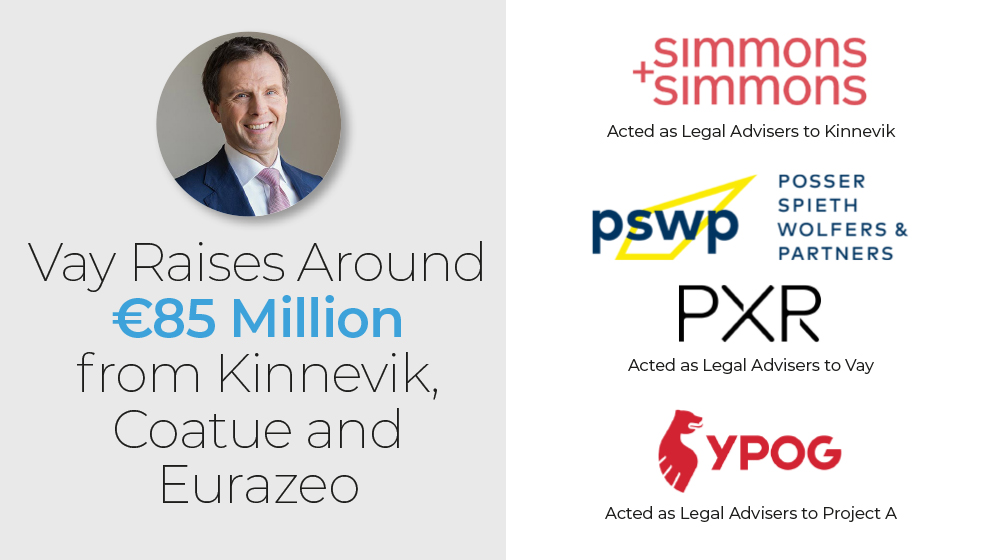The funding round, with a total size of €85 million, was led by Kinnevik, Coatue and Eurazeo. PXR Legal also advised Vay, while Simmons & Simmons advised Kinnevik.
Vay is a Berlin-headquartered company that aims to launch a driverless, certified, commercial mo-bility service on public streets from 2022. Vay enables a person to remotely drive a vehicle using its teledrive-first approach to autonomous driving. As a human is still in full control, this allows for a safe and timely rollout of driverless mobility services that users and cities trust.
The POSSER SPIETH WOLFERS & PARTNERS team was led by partner Dr Benedikt Wolfers MA and associate Nils Schlenkhoff.
Lawyer Monthly had the pleasure to speak with Dr Benedikt Wolfers at Posser Spieth Wolfers & Partners to give us some further insight into this transaction:
Please tell us more about the role that your team played in this transaction.
Since Vay’s early start-up phase and throughout the entire transaction process, our team advised Vay on a wide range of complex regulatory issues mainly pertaining to challenges arising under the international UN ECE, EU and national regulatory framework. The core of our advising work involved the highly complex legal question of whether teledriving, i.e. to remotely drive a vehicle, can be approved from a regulatory point of view. In this context we provided Vay with comprehensive in-depth legal support.
How did you ensure that your skills were suited to the task?
As part of my 25-year-long consulting career I have extensively advised on various new regulatory matters in the field of modern technology and the automotive sector of the future, providing legal assistance to OEMS as well as governments and regulatory authorities. This sector-specific expertise was essential for providing the innovative know-how required for the permissibility of teledriving, a central condition for the current funding round.
Were any significant challenges encountered while you advised funding round? How did you overcome them?
From a regulatory perspective, teledriving is very demanding, with many of the arising issues having not been expressly addressed yet by the current regulatory framework. It is not normal driving since there is no driver in the car. It is not autonomous driving either since the car is driven by a human driver. Therefore, a particular challenge has been to show the government and regulator that, if the regulation speaks about a human driver, this does not require a driver within the car but can also refer to a remote teledriver. Further, we advised on the creation of new and forward-looking regulation which clarifies what teledriving is. Within the financing round it was important to explain this regulatory framework to investors and thus convince them of the legal viability of the business idea.
From a regulatory perspective, teledriving is very demanding, with many of the arising issues having not been expressly addressed yet by the current regulatory framework.
How does your work on this funding round fit the profile of your firm?
POSSER SPIETH WOLFERS & PARTNERS specialises in the regulation of various industries, with a strong focus on the finance, infrastructure and automotive sectors. For instance, our team has been involved with the manufacturing and approval process for SAE Level 3 and 4 driving systems as well as with the development of vehicle approvals and road traffic law generally. This expertise was essential for providing the assistance required for the funding round and will be an important lever for enabling teledriving on German and European roads as well as stimulating further digitalisation of the automotive sector.
What implications does the success of this funding round have for the automotive sector in Germany?
The success of this funding round will serve as an important signal to prospective investors interested in contributing to the automotive industry of the future, boosting large-scale investments in the sector. This transaction represents a further milestone towards promoting the deployment of teledriven cars, increasing possibilities of vehicle use (e.g. merging rental car services with cab services) and fostering the legally safe rollout of bridging technologies towards autonomous driving.
Do you expect to advise on similar financing rounds in the near future?
I am certain that many more transactions relating to teledriving and automated and autonomous driving technologies will follow, in which our long-standing national and international regulatory expertise relating to this area of practice will provide for the needed assistance.





















